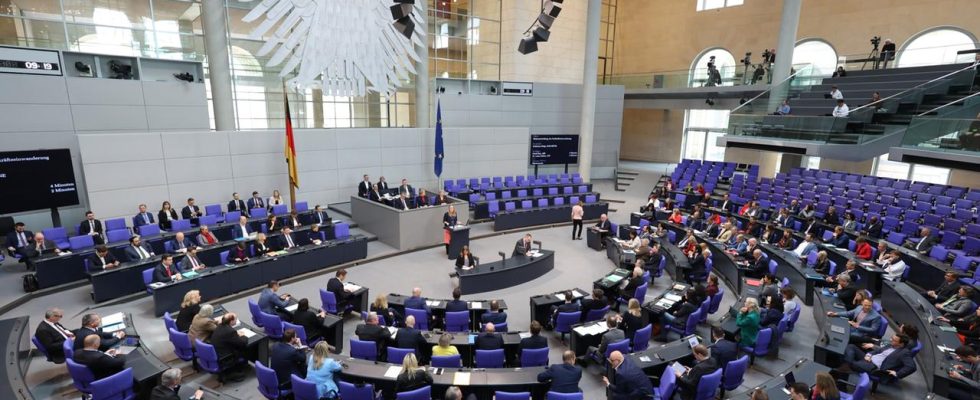A law passed by the traffic light coalition is intended to make it easier and more attractive for people from other countries to take up a job in Germany. The Bundestag has now debated this for the first time – and argued.
Representatives of the traffic light coalition and the opposition exchanged blows in the Bundestag about the planned immigration law for skilled workers. Speakers from the Union and AfD accused the SPD, Greens and FDP that the law they were planning would encourage the wrong people to move in.
The law only attracts “less qualified people,” said CDU MP Alexander Throm. His parliamentary colleague Hermann Gröhe said something similar: “We want to be more inviting for the qualified people we need. You want to invite those who are not qualified, that’s the difference.”
Gerrit Huy, labor market politician for the AfD parliamentary group, accused the government of recruiting “under-skilled workers” because Germany was no longer attractive to highly-skilled workers. AfD MP Götz Frömming said that Germany is not attractive as a job, but as a social welfare office.
Faeser: 16 years of “reform backlog”
Representatives of the SPD, Greens and FDP sharply rejected the allegations. In the future, it will not be possible to cover the labor requirements with domestic forces alone. Germany needs a welcoming culture and must be an attractive country. The Union is trying to prevent immigration and is thus endangering the economy.
Minister of Labor Hubertus Heil accused the Union of apparently wanting only academics and not also professionally qualified people to come: “But we need helping hands and clever minds,” emphasized Heil. Because the baby boomer generation will be retiring in the coming years, politicians must do everything possible to counteract the labor shortage. Otherwise there is a risk of a shortage of seven million workers by 2035.
Greens: Union stirs up resentment
Interior Minister Nancy Faeser – like Heil from the SPD – spoke of a change of course after 16 years of “reform backlog”. The shortage of skilled workers harm Germany. There are currently high bureaucratic hurdles for foreign skilled workers who come to Germany. With the reform of the previous law, Germany wants to create the most modern immigration law in the world, according to Faeser.
The parliamentary group leader of the Greens, Katharina Dröge, accused the Union of continuing to stir up resentment against foreign workers. But Germany needs a welcoming culture in order to be able to keep up with other countries.
Statistician: potential at most still with part-time employees
According to surveys by the Federal Statistical Office, there are hardly any reserves left in Germany to replace missing or soon-to-be-retired skilled workers. According to the latest results of the micro-census, 87 percent of the population between the ages of 25 and 59 are already in gainful employment. For men it is even 92 percent, while 83 percent of women have a paid job.
The statisticians still see potential among part-time employees. However, there are also people who could participate in working life alone in a part-time job.
points for knowledge of German and Experience
With the amendment to the Skilled Immigration Act, which was originally decided by the coalition of CDU, CSU and SPD under Chancellor Angela Merkel, the traffic light coalition wants to make the immigration of skilled workers much easier. In the future, foreigners from non-EU countries will be able to come to Germany to look for work with a “chance card” based on a points system – language skills or professional experience count here.
Specialists with professional qualifications and experience can come without having to have their qualifications recognized by Germany beforehand. They should be able to do that again. For foreigners with a degree recognized by Germany, the hurdles, such as the prescribed minimum salary, will be lowered.
The Bundestag discussed the draft law on Thursday in the first reading. It will then be discussed in the committees before it comes back to the plenary session of Parliament for the final vote. The regulations should come into force on December 1st at the earliest. The law is not relevant for people from other EU countries. The freedom of movement for workers applies to them – they can freely choose their job within the EU.

